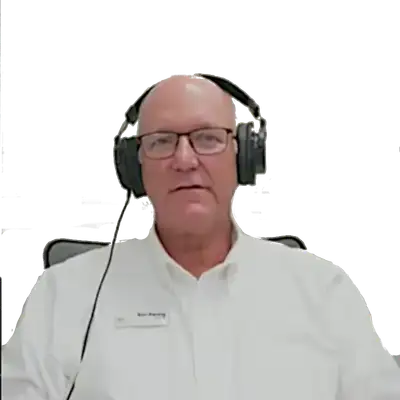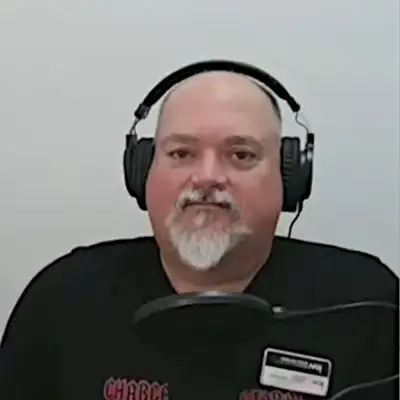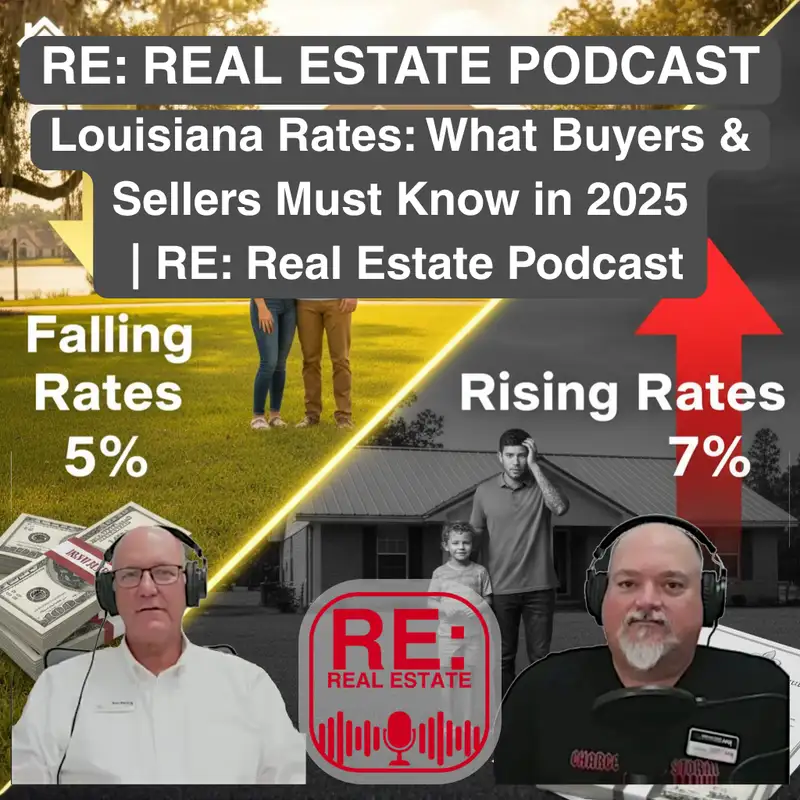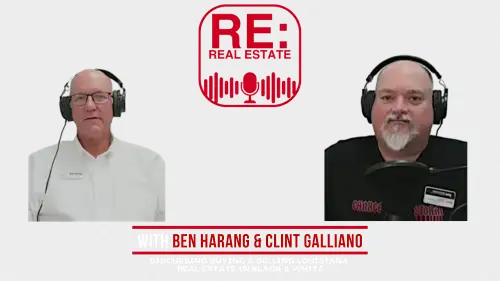Ep. 56 - Interest Rates Magic Episode | Oct 29, 2025
Clint C. Galliano, REALTOR® (00:14)
Welcome to another episode of the RE: Real Estate Podcast. I'm one of your hosts, Clint Galliano and with me is our other host, Ben Harang Hey, Ben, how you doing?
Ben Harang, REALTOR® (00:27)
Clint, I'm doing terrific, The shining, the wind's blowing. Life is lovely. How's things in Houma?
Clint C. Galliano, REALTOR® (00:36)
it's slightly cooler than it was yesterday or the day before. So that's if it could stay like this all year long, I'd be in heaven.
Ben Harang, REALTOR® (00:40)
That's no joke.
Mm-hmm.
You get that twice a year for six months at a time. Just right.
Clint C. Galliano, REALTOR® (00:50)
be perfect.
Alright, Ben, what we talking about today?
Ben Harang, REALTOR® (00:53)
Well, there's a number that can send a shockwave through the entire housing market. It can change what you can afford, how long takes to sell, and the final price of a home. We're talking about, of course, interest rates.
Yeah, but the national headlines don't tell the whole story, especially not here in South Louisiana. Today we're cutting through the noise. We'll break down exactly what these rates, rate changes mean for a buyer's monthly payment and for a seller's bottom line. We're going to give you the strategies to win whether you're buying or selling in this market.
And we'll talk about the South Louisiana X factor that makes our affordability challenges unique. Stick around. You need to hear this.
Clint C. Galliano, REALTOR® (01:42)
All right. First up, we're going to talk about the buyer side.
I'd say for 99 % of buyers, the monthly payment is king. That's the main thing that they go by because at least in the majority of our market, they're trying to stay within what they can afford. Even though they'd much rather buy way outside of their budget, they'll only be able to get a loan for what they can afford. And ultimately, what we're relying on is math.
And so what we're gonna do is we're gonna explain the purchase power. All right, so let's get to it. Buyer doesn't just buy a $300,000 house, they buy a monthly payment.
Ben Harang, REALTOR® (02:24)
I I can't write a
check for $300,000 for a house.
Clint C. Galliano, REALTOR® (02:27)
you can if you've got $300,000 sitting in the bank. But I would say, that's what I was going to say, the majority of our market does not have that, or at least readily available. So.
Ben Harang, REALTOR® (02:30)
Not too many people do.
Right.
Clint C. Galliano, REALTOR® (02:40)
They buy the monthly payment is what they go for. So can you break down the real world math? What does a 2 % jump in interest rates say from 5 % to 7 % actually due to a buyer's wallet on a $300,000 home?
So what do you think, Ben?
Ben Harang, REALTOR® (02:58)
well i believe if at five percent is twenty two hundred dollars and at seven percent it's twenty five seventy six so we're talking about a three hundred and seventy six dollar difference for the same house everything being being equal except the interest rate that two point jump between five and seven percent changes at three hundred seventy six dollars a month which you and i were talking about you get by
Used to be able to buy a car for that. I'm not sure how much of a car you can buy for that today, but that's a car payment.
Clint C. Galliano, REALTOR® (03:29)
Yeah.
Yeah. I mean, you're looking at $400 a month. That's almost, I'd say roughly at today's interest rates, you're probably looking at about $25,000 a car payment. So basically means that the same buyer at 7 % can't afford that $300,000 house because they likely can't afford the payment.
Ben Harang, REALTOR® (03:42)
Mm-hmm. Yeah.
Right.
Clint C. Galliano, REALTOR® (03:54)
and they're having to readjust their budget and look at a $250,000 house.
Ben Harang, REALTOR® (04:00)
If they're tapped out, that $2,200 taps out their budget, then they need to go down. If it doesn't tap it out and they choose to stay in that $300,000 range, they'll pay the difference caused by the interest rate.
Clint C. Galliano, REALTOR® (04:15)
Yep. Yes, indeed. So the South Louisiana X factor is principal interest, taxes, and insurance. And so those figures are based on insurance and taxes on approximately a $300,000 house. the payment isn't just principal and interest. So we got to take a...
take into account those taxes and insurance. So if you're going for a resale in a new home community, then you're gonna be hit with buying it outright. And they're not gonna list it at a discounted price from what the new construction's selling. They're gonna say, well, that house is selling for that, so I can sell for right around that. And people are interested in that, they'll look at buying that. If they're...
interested in.
you know, and again, if they don't want to take advantage of new construction and all the benefits of that, that we talked about on a previous episode. So you're looking at, you know, 3000 to 3500 a year in taxes and roughly two to $3,000 in insurance a year.
that right? Yeah, roughly about that, give or take. ⁓ You know, so that's still a good bit of money in that because your lender's not just gonna trust you to pay that out of pocket right off the bat. That all gets broken down into your monthly payment and added to your principal and interest. So it jacks up your monthly note.
Ben Harang, REALTOR® (05:39)
Yeah. Mm-hmm.
Clint C. Galliano, REALTOR® (06:03)
And so the big thing is that the higher your insurance and your taxes are, the higher your notes are going to be regardless of the price of the house.
Ben Harang, REALTOR® (06:03)
Mm-hmm.
Right, right. And one thing we were in a meeting this week that I didn't realize at the time, the flood insurance policies during the government shutdown, which is shut down when we're recording this, so I guess I'm going date this video, is the flood insurance is not transferable. The NFIP is not able to transfer the flood policy from the seller to the buyer, which means
If it's required, you need to go back in and buy it at today's actuarially sound rates, which means a premium increase from what the seller was paying. So that's very unfortunate that that's going on right now.
Clint C. Galliano, REALTOR® (06:51)
Well, on top of that,
well, they can't buy NFIP insurance. So they've got to go to private insurance. if it's in a zone that requires flood insurance, those premiums are going to be accelerated from what the NFIP rates are.
Ben Harang, REALTOR® (06:55)
That's true. That's true. You can't buy it at all. So if it's
Clint C. Galliano, REALTOR® (07:10)
if it's in a zone that doesn't require, and this is based on at least I can say secondhand knowledge based on what the insurance brokers are telling me. If they're not in a zone that requires insurance with a loan, then they are fairly reasonable on those rates. But they're saying that they're seeing higher private flood insurance rates in the zones that it's required.
Ben Harang, REALTOR® (07:17)
Mm-hmm.
Okay. All right. I haven't seen a private flood quote yet. So that's just something that's changing as we're talking.
Clint C. Galliano, REALTOR® (07:38)
You know,
Yes.
That's like the meme on Facebook of the mouse taking advantage of the other mouse that's caught in the trap chasing after the cheese.
Ben Harang, REALTOR® (07:58)
Mm-hmm. Yeah.
Yeah.
Clint C. Galliano, REALTOR® (08:03)
So some things to talk about, about advice for the buyers that feel stuck, waiting for rates to drop, something you can do today. I'll give you a warning here, and Ben and I kind of discussed this a little bit. Actually, we've mentioned this a few times. We don't like the phrase, marry the house, date the rate. ⁓
Ben Harang, REALTOR® (08:21)
Right.
Clint C. Galliano, REALTOR® (08:22)
You know, they say you can always refinance when or if rates drop later. That's, that's if you feel that the rates are going to drop soon. I don't like taking that approach because that's, to me, that's like smoking hopium. You know, you're hoping that something's going to happen, but it's not based on sound accounting. But, if you, know, if you're okay with it.
Ben Harang, REALTOR® (08:39)
Right.
Right.
Clint C. Galliano, REALTOR® (08:47)
and you can afford it at the rate that it is and you need a place to stay, then by all means go into it and look for the opportunity to refinance when you can get a better rate.
Ben Harang, REALTOR® (09:03)
Right, and just make sure that, and I guess the lender will make sure, but make sure that the note at the current rate is sustainable long term if it doesn't change. Don't do it the way you have $2 left in your bank account at the end of the initial rate and then you can't refinance it because you're out of cash.
Clint C. Galliano, REALTOR® (09:14)
Right.
Ben Harang, REALTOR® (09:27)
at the end of the term, then you're So, don't spend your last dollar on a house. Buy your first house first, not your last house first. Okay, I'm off my soap box.
Clint C. Galliano, REALTOR® (09:36)
We could get that tattooed on your forehead, Ben.
Ben Harang, REALTOR® (09:38)
Hehehehehe
Clint C. Galliano, REALTOR® (09:39)
Another opportunity if you're looking for getting creative is look at new construction like we talked about on a previous episode. Between the incentives and the warranties and the cheaper insurance and everything, it's a good opportunity for buyers. And especially, and this is something that we'll talk about in this next segment that we...
we go over, but what a lot of the new construction builders are doing, they're offering rate buy downs. They don't tell you it's a rate buy down. They say, hey, we'll give you this great rate. But what they're actually doing is taking incentive dollars that they were normally just giving towards closing costs and buying down the rate because they found that
Ben Harang, REALTOR® (10:13)
Mm-hmm.
Right.
Clint C. Galliano, REALTOR® (10:27)
it's actually more beneficial to the buyers to have a lower rate than just to give them cash at closing.
Ben Harang, REALTOR® (10:34)
Right. Right. So.
Clint C. Galliano, REALTOR® (10:38)
And the other thing too
is ask for concessions. And we'll cover that also when we look at things from the seller side.
Ben Harang, REALTOR® (10:47)
Okay. All right, some good ideas there, Clint. So let's talk about what happens from the seller's side. Clint just talked about on the buyer's side, but if you're selling a house as the interest rates are more elevated than they used to be, so we can flip the script.
Clint C. Galliano, REALTOR® (10:47)
All right, Ben, take it away.
Ben Harang, REALTOR® (11:04)
My neighbor sold the house in two days with 10 offers back when the rates were 3%. Why is my house sitting on the market for 30 days? Well, the short answer is because the rates are not 3 % anymore. And they probably got over list price on this house too. It's simple, the buyer pool is smaller because fewer people qualify as the rates go up.
And as we discussed, the buyer who could afford your house two years ago is now shopping in a lower price range. Your home's buyer ability has shrunk. So this means days on the market goes up and sellers have to be more realistic on the price. You're no longer in a market where you can just name a price and get it. So here's some seller strategies.
This is where a smart seller can win instead of just dropping the price by $15,000. What's the strategy we're seeing more and more of the seller concession or rate buy down?
The seller pays a couple of thousand dollars at closing to buy down the buyer's interest rate for the first two years. And then a straight buy down, which is buy down for the term of the loan. So think about the marketing power. A seller can offer to pay for a buy down. For the buyer, their payment is 2 % lower in a year, in year one, and 1 % lower in year two. That's a massive...
Incentive in a straight buy down last throughout the life of the loan So you're differentiating your house from the rest of the houses on the market that you're just sitting there and said, please buy me
It's often cheaper for the seller than a big price cut. And it's more valuable to the buyer because it directly addresses their monthly payment pain point. It's the number one strategy for sellers in a higher rate market.
and Clint and I were talking about before we started recording the how creative the financing portion has become to get people in the houses that, a two or $3,000 rate by down is worth more than a $15,000 price reduction to the buying public. that's, that's wild. so.
Clint C. Galliano, REALTOR® (13:24)
ultimately the buy down is a gift that keeps on giving to the buyer. ⁓ They give them a concession of cash at closing, kind of same thing like what I was talking about, the new construction builders are doing. It gives them a break on the purchase, but it's just kind of a momentary thing and then they still have their note.
Ben Harang, REALTOR® (13:30)
Right.
Clint C. Galliano, REALTOR® (13:47)
But with that rate buy down, if you do the permanent buy down, you could take a chunk of that same money that you would have put towards closing costs, buy down that rate, and they've got a significantly lower note. And that gives them more cash on hand during the term of the loan, the life of the loan, at least until they sell or refinance. So that should be a bigger benefit to them.
Ben Harang, REALTOR® (14:07)
Mm-hmm. Right.
Clint C. Galliano, REALTOR® (14:13)
And ultimately it's up to the buyer to understand that and their agent to help them understand that.
Ben Harang, REALTOR® (14:20)
and it is crazy the houses we see on the market that you sit there and there's nothing creative about even offering a buy down but buyer savvy buyer agents can structure an offer for you to help you win the house it's agreeable to both you and the seller and it doesn't crush either one of you
So that's a win-win situation and you get the house you were looking for and you might still qualify for the $300,000 house rather than having to back down to 250 because of the difference in the interest rate.
Clint C. Galliano, REALTOR® (14:57)
Indeed. So we kind of ran over this, but market's all about the monthly payments. If you can understand that, you can win, whether you're buying or you're selling. If you've got questions about your own payment, a buy down or what your home is worth, go to https://rerealestatepodcast.com/ask-a-question and ask your question.
We'll answer it on a future show. Besides that, go to rerealestatepodcast.com, like, subscribe, share it with your friends, comment. You can watch our YouTube videos from there. You can listen to individual episodes right there on the website, or you can subscribe with your favorite podcast app. We'd love to have you. And if you think this is helpful,
share it with your friends, you know, and if you know of anybody that's in need of a realtor or even just advice, give Ben or I a call and you can find our contact information on RERealEstatePodcast.com. All right, Ben, I think that's another one in the can, right?
Ben Harang, REALTOR® (16:02)
All
right, Clint, just, and Clint and I are both open to just talking about it without any obligation. Just start a dialogue and see where you are in the process. You might be surprised with what can happen. So, all right, I'm done, Clint. All right, have a good one, man. Thanks for watching.
Clint C. Galliano, REALTOR® (16:18)
No. All right.
All
right, talk to you all later. Bye bye.
Creators and Guests



